
by Valley Gadfly | May 20, 2024 | Main Articles
by Glen Richardson
 A political website called “RINO Watch Colorado” (www.rinowatchco.com) has turned the political media world upside down in Colorado. The website was mentioned in last month’s lead story (As Colorado Becomes A One-Party State The Main Parties Fracture). RINO Watch bills itself as “the voice of grassroots Republicans” where “it exposes RINOs (Republicans In Name Only)” and “supports grassroots Patriots” while “cutting through the Establishment and liberal spin.”
A political website called “RINO Watch Colorado” (www.rinowatchco.com) has turned the political media world upside down in Colorado. The website was mentioned in last month’s lead story (As Colorado Becomes A One-Party State The Main Parties Fracture). RINO Watch bills itself as “the voice of grassroots Republicans” where “it exposes RINOs (Republicans In Name Only)” and “supports grassroots Patriots” while “cutting through the Establishment and liberal spin.”
The grassroots believe they represent about 70% of the Republican Party in Colorado. But the Republican billionaires who donate in Colorado (Phil Anschutz. Paul Singer, and Charles Koch), as well as all the media, oppose and demonize the grassroots and now, of course, RINO Watch.
RINO Watch, an upstart website, was attacked relentlessly by virtually every media outlet in the state of Colorado. It was repeatedly attacked by moderate Republican columnist and political consultant Dick Wadhams. He published entire columns about RINO Watch in the Denver Gazette, Colorado Springs Gazette, Colorado Politics, and Complete Colorado — all owned or controlled by billionaire Phil Anschutz. Jimmy Sengenberger, another columnist in those publications wrote another whole set of columns denigrating RINO Watch.
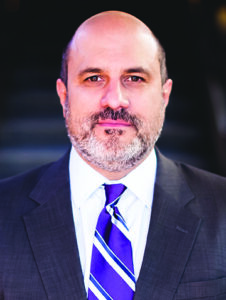
Jon Caldara

Mandy Connell

Jimmy Sengenberger

Dick Wadhams
The Denver Post had Republican opinion writer Krista Kafer attack RINO Watch along with a full-sized cartoon by the writer. Jon Caldara, president of the Independence Institute, and Sherrie Peif, a reporter for Complete Colorado, separately penned articles letting RINO Watch have it in the Institute’s quarterly bulletin. Democrat Ann Marie Swan, the Opinion Editor for the Durango Herald and The Journal in Cortez, Colorado, wrote her lead editorial attacking RINO Watch for trying to shame Republicans she liked because they were always losing to her Democrats.
The radio world is equally and universally vicious. Jimmy Sengenberger, before quitting in a huff, had a Saturday morning show where he repeatedly went after RINO Watch on his and Peter Boyles shows. He was replaced on 710 KNUS on Saturday mornings with Jon Caldara who kept up the attacks slamming RINO Watch.
Perhaps the site’s greatest critic on radio has been Mandy Connell who has a radio show on 850 KOA weekday afternoons. Connell invited contributors of RINO Watch, including a marketing representative of the Chronicle, to come to the KOA studio to discuss the website. In what appeared to be an incredible display of ill temper, she began yelling and berating them only to embarrass herself as they, according to listeners, calmly out debated her.

Republican billionaire opponents of Colorado grassroot Republicans. Above, Phil Anschutz
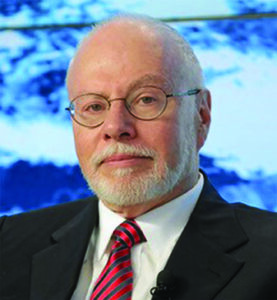
Paul Singer
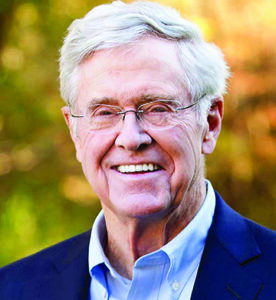
Charles Koch
RINO Watch discovered that Connell had lied during the show about her best friend, Republican Consultant Kelly Maher, who claimed she had nothing to do with Bob Beauprez’s Colorado Pioneer Action, an entity fined the greatest amount ever for campaign violations in the history of Colorado. Matt Arnold, of Campaign Integrity Watchdog, who brought the action against Colorado Pioneer Action, was listening and had in his files the checks from Colorado Pioneer Action for the benefit of Kelly Maher, appearing to prove that Mandy Connell was lying and knew it.
According to it’s website, RINO Watch minds the crescendo of criticism as the huge amount of press converted the once obscure website into a behemoth with more clicks and reads than any other political site in Colorado.
But what exactly does RINO Watch do? It appears to identify Republicans who it believes are moderates but claim to be strong conservatives. It then places them on a fictional Wall of Shame, sometimes with colorful language. In turn, it identifies people it believes are real conservatives and places them on a fictional Patriot Hall of Fame.
The outrage goes to the fact that moderate Republicans, who go along with the Democrat agenda, are never criticized in the Colorado media but lionized as “rock ribbed” conservatives. A previously unknown website that disagrees with this analysis becomes an enormous threat to the Establishment, not dissimilar to the little boy who states that the emperor has no clothes on.
But failing to destroy the website, the Colorado media has made a must-read site for tens of thousands of Coloradans. Unfortunately for the Colorado media they can not put the genie back in the bottle and RINO Watch is anticipated to continue to grow.
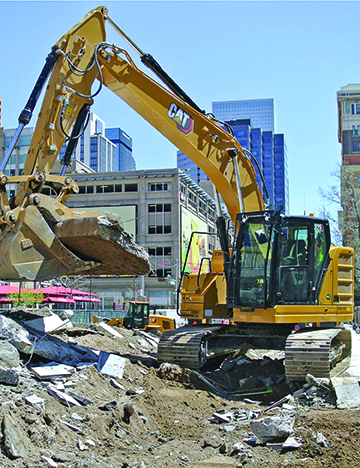
by Valley Gadfly | May 20, 2024 | Main Articles
A Block By Block Comeback Is Planned By Denver; Will Costly Makeover Craft A 21st Century Street Or Stumble?
by Glen Richardson
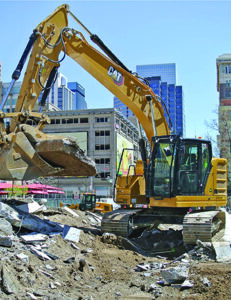
Demolition Derby: PCL Construction crews work to complete the 16th Street Mall makeover. Street was initially slated for completion by year’s end.
Launched in April of 2022 with a $90-$130 million cost estimate, completion of downtown Denver’s 16th Street Mall was slated for wrap-up by the end of this year at a cost of $149 million. As the deadline draws near, City Council has approved (7 to 3) a $1,150,000 contract — between the city and the Downtown Denver Partnership — to continue redesigning and reactivating the strip. The cost is now estimated at $172.5 million.
Completion is now probable “for the fall of 2025.” Workers hope to have fences down on half of the blocks under construction and open to the public at the end of 2024. Those blocks, however, will still need small-scale finishing touches.
Once home to more than 300 stores and 50 restaurants, businesses along the 1.2-mile corridor between Wazee St. and Broadway are open and accessible, but struggling. Sales are down 25-30% or more. T.J. Maxx and McDonald’s are among those driven out. The 16th Street Mall Business Support program has awarded 177 grants to 103 businesses for more than $1 million. The first to use a grant, closed a few months later due to crime and their windows shot out. Even businesses that were receiving free rent have gone.
Unique To Simulated
When opened the 16th Street Mall was among the most iconic places in Denver, recognized for its high-quality design, enduring materials, and value as a civic space. It was selected for the National Register of Historic Places due to the exceptional caliber of its design and designers, including I.M. Pei, Henry Cobb, and Laurie Olin. The Urban Land Institute called it “public art of the highest international quality.”
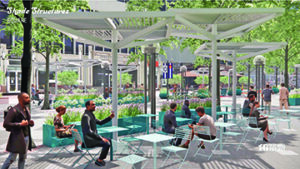
Shady Spaces: Rendering of shade structures being designed to hopefully make the reactivated mall desirable and engaging.
The unique is now being replicated by today’s overseers. Some of the original elements will remain, including light fixtures, trees in linear rows, and use of granite. Nonetheless, much of the project is being heavily altered. Promises were made, for example, to recreate the original granite paver-pattern, inspired by Navajo rugs and a snake skin belt. Sadly, plans shifted late in the design-build process, with PCL Construction using smaller pavers than the original, and laying them differently in the transit and pedestrian lanes. As a result, it breaks-up the unity and cohesion of the intricate and elegant design.
The intent of today’s design team — the City of Denver, the Downtown Denver Partnership and RTD — was to honor and recreate elements of the original design. However, the mall is being transformed, resulting in such significant loss of integrity that it will no longer be eligible for the National Register of Historic Places.
Current Construction
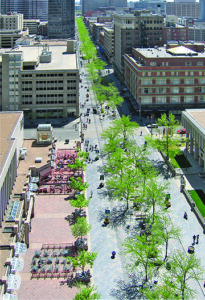
Tree Lined Treat: The 1.25-mile-long 16th Street runs from Union Station at Wewatta St. to Civic Center Station at Broadway.
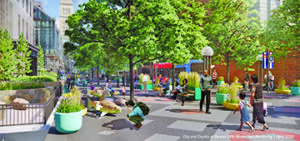
The Road Ahead: Department of Transportation & Infrastructure rendering of what the 16th Street Mall will look like when finished in the fall of 2025.
Potholing — drilling holes to confirm underground utility locations — may still require lane and sidewalk closures on the 16th Street Mall and on cross-streets. Identifying existing water-sewer pipes, and electrical conduit lines, continues to reduce the chance of them being encountered during construction. Signage is being used to help pedestrians and motorists navigate any new closures.
Intersection renewal includes adding shallow utilities, such as electric, traffic signal, and lighting infrastructure. Plus pouring concrete pavement, painting traffic and pedestrian striping continues. Trees for the project were grown and acclimated at tree nurseries. Those trees have now been planted in blocks one and two along16th Street.
Craftsmen laid the pavers by hand along the center transitway during Phase One of the project. Texture of the new granite pavers — PCL Construction and city officials claim — will provide more traction, thus improving safety for the next generation of mall pedestrians.
Moments Of Joy
The new mall will feature elements designed to hopefully make 16th Street desirable, and engaging. Site furnishings, play features, and moments of joy are being distributed up and down the street. They include tables, chairs, benches, shade structures, and planters. The play features are designed to engage kids along the street. Lastly, there will be “Moments of Joy” to bring a bit of delight to the street; make you smile, pause for a moment, or snap a photo to share.
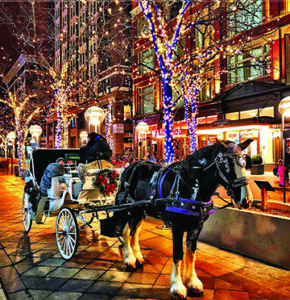
Magic Memories: Horse drawn carriage rides along the 16th Street Mall were for years a memorable experience for couples, kids, and families.
Distribution of the elements are being arranged along the corridor accordingly: Local Link from Market to Curtis; Press Play, Curtis to California St.; Experience 16, California to Tremont; and Jump Start from Tremont to Broadway. Arrangement of the features are designed to create attractions. But they will also provide moments of relaxation and fun for families, residents, visitors, and workers visiting downtown’s core.
Site furnishings are being organized into three basic room types: feast, lounge, and arrow. Feast rooms were created with food in mind. They will be spaces to share lunch with a friend or eat solo and catch up on emails The lounge rooms are spaces to allow you to slow down and stay for a bit. Visitors can take a moment to plan their next step. The space will allow downtown employees a place to pause in the shade between meetings, plus providing a site where residents can enjoy people watching. Arrow rooms will give visitors an accurate, vivid look at downtown.
Final Impact
Prior to the 16th Street overhaul launch, city officials said the investment would, “be well worth the price.” They reasoned it would improve or solve safety and infrastructure deficiencies. Replacement of a water line dating from the 1880s is expected to help drainage. The project also adds more surface friction on the walkways to improve pedestrian safety.
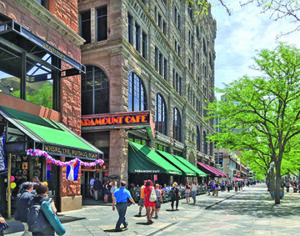
Denver Destination: Opening to the public in 1982, the 16th Street Mall was Denver’s most visited tourist destination for more than 30 years.
Moreover, removing the existing median and shifting the paths of the two bus lanes will add 10 ft. of dedicated, unobstructed sidewalk space on each side of the mall. In addition to more space for pedestrians, the project provides an opportunity to add amenities, while also being able to present additional community events.
More importantly, the city believes the project will play a key role in downtown Denver’s post-pandemic economic turnaround. Admittedly skittish about using the figure today, city leaders said prior to the launch it would increase downtown’s gross regional product — a version of the national gross domestic product, or GDP. How much? By a whopping $3.7 billion!

by Valley Gadfly | Apr 19, 2024 | Main Articles
by Glen Richardson
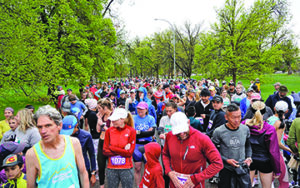
Mom Romp: Annual City Park Mother’s Day 5K run-walk starts at 9 a.m. Flippin’ Flapjacks serves a pancake-sausage breakfast with OJ.
This is the month when we celebrate your first best friend and the person you turn to when you need advice. In 1914 Congress and a Presidential Proclamation established the second Sunday in May as Mother’s Day.
A day to honor mothers has existed for as long as, well, there have been mothers. They are like glue. Even when you can’t see them, they’re still holding the family together.
Here’s the Chronicle’s guide for showing your mother, grandmothers, sisters, aunts, and friends how special they are:
Beach Break
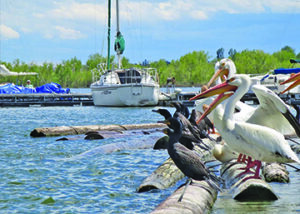
Beach Beckons: For pier to plate dining, take mom to Denver’s only lakeside venue for a special Mother’s Day brunch at The Lake House at Pelican Bay, 11 a.m. to 2 p.m.
Take Mom to Denver’s only lakeside venue for a special brunch at The Lake House at Pelican Bay. In Cherry Creek State Park, this one-of-a-kind location offers breathtaking views, an expansive sandy carpet, and classic brunch choices with champagne, 11 a.m. to 2 p.m. Information: 303-220-5253.
Home Tour

Home Outing: This modern farm house built in 2015 is among homes being shown at the Wash Park Home Tour & Market Street Fair May 11, 10 a.m.-3 p.m.
Get mom in a merry mood for Mother’s Day by taking her to the Wash Park Home Tour & Market Street Fair May 11, 10 a.m.-3 p.m. Mom and the family can tour homes at their leisure while also enjoying local artisans, vendors, and entertainment at the Market Street Fair located on the 100 block of S. Humboldt St. (between Cedar & Bayaud).
The home tour is in the 100 and 200 blocks of East Wash Park, north of Alameda and east of Downing. Tour home locations are: 138 S. Downing; 140 S. Lafayette; 216 S. Humboldt; 190 S. Humboldt; and 193 S. Franklin.
Hosted by Steele Elementary’s PTA, funds raised directly support programs and services that make Wash Park’s neighborhood DPS elementary school special. Additionally, a percentage of funds raised this year will also benefit families in need through the LOVVE Project, by providing fresh food, hygiene products, and cleaning supplies to Virginia Village neighbors in partnership with Ellis Elementary.
Jazz Jam

Jazz Brunch: Pianist Adam Bodine tickles the ivories at swinging, groovy Mother’s Day Jazz Brunch at Dazzle Denver, 9 a.m.-2 p.m.
Enjoy a kid-friendly Mother’s Day brunch at Dazzle Denver, from 10:30 a.m. to 12:30 p.m. The event features a special daytime performance by Freddy Rodriguez Jr. and The Jazz Connection, which blends Latin, funk, and jazz. Freddy continues the legacy
of Denver’s legendary jazz club El Chapultepec. Information: 303-839-5100.
Railroad Mom
Treat mom to the Royal Gorge Route Railroad Mother’s Day Brunch train trip May 11 or 12, departing at 12:30 p.m. Two-hour excursion is in elegant dining car as you enjoy special brunch, spectacular views. Trip runs from the Santa Fe Depot in Canon City, chugs through the Royal Gorge. Information: 719-276-4000.
Runaway With Mom
Race to City Park for a run-walk with mom during the Mother’s Day 5k May 12, 9 a.m. You’ll be cheered by enthusiastic volunteers and spectators, creating a festive and supportive atmosphere that is sure to make the day unforgettable. A pan

Tea Time: Cherry Creek’s Halcyon Hotel hosts this Mother’s Day Tea in the Arbor Room from 11 a.m. to 2 p.m.
cake-sausage breakfast with OJ is provided by Flippin’ Flapjacks. Information: denvermothers day5k.com.
Take Tea Time
Delight mom at Mother’s Day Tea in the Arbor Room at Cherry Creek’s Halcyon Hotel, May 12. Menu includes baked ham and cheddar sandwiches, deviled eggs, and smoked salmon toast points. The more than half-dozen tea choices come with chocolate Hazelnut macarons, lemon blueberry cake, plus selection of scones. Information: 720-772-5000.
Or, give her a tour of the Molly Brown House plus a high tea with fruit, scones, tea sandwiches, desserts on Mother’s Day, 10:20 a.m. to 12:20 p.m. Information: 303-832-4092, ext. 13.
Mom’s Day Dining Ideas
Here are restaurants serving on May 12 to pamper and delight mom and family with fine cuisine on Mother’s Day:
Bon Ami: Quaint little Wash Park French gem on the corner of Alameda & S. Pennsylvania St. serves classic French dishes plus savory and sweet crepes. Information: 303-862-4959.
Edge Restaurant & Bar: Located in downtown’s Four Seasons Hotel, eatery will host a brunch buffet from 8 a.m. to 2 p.m. Information: 303-389-3050.
Fire Restaurant & Lounge: Serving seafood selections, including a whole salmon carving station, plus omelet station. Danish, scones, more choices served. Information: 720-709-4431.
Guard and Grace: California St. steakhouse has appetizers, raw bar, & brunch items. Menu includes Filet Flight, Black Cod, and a burger, 10 a.m.-2:30 p.m. Information: 303-293-8500.
Le Bilboquet: Cherry Creek French eatery is serving a three-course prix fixe brunch. Brunch is from 11:45 a.m. to 2:30 p.m. Dinner is from 5 to 7 p.m. Information: 303-835-9999.
Local Jones: Signature eatery in Cherry Creek’s Halcyon Hotel is hosting a brunch from 7:30 a.m. to 2 p.m. Dinner service is from 4 p.m. to 10 p.m. Information: 720-772-5000.
Monaco Inn Restaurant: Lamb Shank, Lamb Chops & Grilled Shrimp, New York Steak & Fried Shrimp, or Grilled Salmon are specials, noon to 8 p.m. Moms get their choice of a glass of Prosecco or dessert of the day. Information: 303-320-1104.
Panzano: Eatery’s Buffet in the Hotel Monaco has cold-hot bar, plus prime rib-ham carving station, and a “Kid-O” menu. Serving 10 a.m.-2 p.m. Information: 303-296-3525.
Toro Latin Kitchen & Lounge: In addition to standard brunch menu, restaurant in Cherry Creek’s Clio Hotel plans specials, 10:30 a.m.-2 p.m. Information: 303-253-3000.
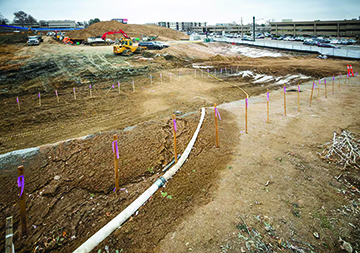
by Valley Gadfly | Apr 19, 2024 | Main Articles
Location Is Latest Newberry Brothers Growth Spot, As The Florist’s Cherry Creek Greenhouse Plot Flourishes
by Glen Richardson
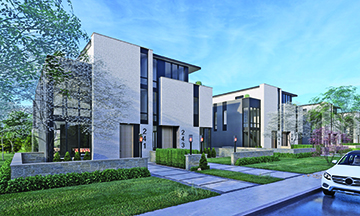
Greenhouse Growth: These phase-two North Pointe Ten stylish townhomes in Cherry Creek North are where Newberry’s six large greenhouses did business for decades.
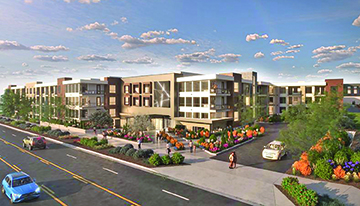
Latest On Leetsdale: Rendering of the three-story apartment home with a basement being built on the five-acre Newberry Brothers Florist site at 5231 Leetsdale Drive.
It may have not occurred to you, but gardens and florists are strikingly similar to townhomes and multifamily developments. They attract pollinators or patrons because they are eye-catching, have room to grow, are not too tall, too crowded, or located in the wrong place.
That’s the development strategy being implemented for a luxury three-story apartment complex with a basement, about to bud in the Washington Virginia Vale neighborhood adjacent to both Glendale and Cherry Creek North. The five-acre site is located along Leetsdale Drive east of Forest St. Weldon Newberry started what became Newberry Brothers Florist at the site. His daughter Paula Newberry Arnold, and her son Kien Arnold, sold the parcel to Texas-based multifamily developer Embrey Partners LLC for $9 million. The Newberry business has moved across Leetsdale Dr. to 560 S. Holly St.
Newberry relocated the florist to the Leetsdale site subsequent to selling the Cherry Creek North location where Newberry’s six large greenhouses did business for decades. That corner spot at 2nd Ave. and Garfield Street is where North Pointe Ten is now located. Garfield Development LLC, paid $7.65 million for the North Pointe property. The development’s Phase-One has since sold out. The project’s recently finished Phase-Two — defined as stylish, sophisticated urban residences — is now complete and available for purchase. The 10 four-bedroom, six-bath, attached townhomes are being offered for $3.4 million each.

Development Dig: Construction workers dig, blast, and grade former Newberry Brothers Florist site on Leetsdale Drive, where the three-story apartment complex will be built. Photo: Kevin J. Beaty
Supreme Site
At the time the Leetsdale property was sold, Newberry Brothers Florist described the five-acre site as, “the kind of compact, walkable, mixed-use neighborhood that city officials often propose as the Denver ideal.”
Initially the neighborhood organization — the Preservation of Residential South Hilltop Neighborhood Assn. — was concerned about possible traffic impact and noise. Following negotiations with Newberry Arnold, height restrictions, traffic entry and departure, plus hotels being prohibited, were mutually agreed upon. As a result, neighbors sent messages of support, announcing they, “looked forward to more retail and residential diversity.”
Traffic rumbles and roars along the stretch of Leetsdale Drive where construction workers and excavation equipment are digging, blasting, and grading the property in preparation to build the apartment complex. Behind the property — up the hill to the north — are neighborhood streets with rows of single-family homes. George Washington High School is to the east, and a King Soopers on the west. Another apart-
ment complex sits on the southwest corner of Leetsdale and Forest, plus a multifamily development is just up the street on Forest, behind Inga’s Alpine Tavern.
Striking Setting
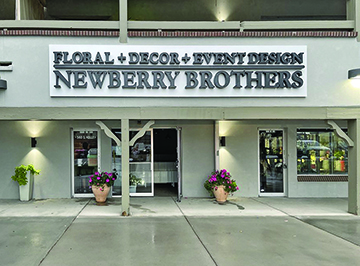
New Newberry Digs: The Newberry Brothers business has moved across Leetsdale to 560 S. Holly St. Floral arrangements, event design, and custom work remain the shop’s focus.
The 283 apartment homes will be nestled into the hillside to the north and east, reducing the scale of the building as it relates to the adjacent residential neighborhoods. It is also expected to conceal parking from the public view along Leetsdale Drive.
The property’s unique topographic advantage due to being located on the side of a hill, will create striking views of the Front Range and the south metro skyline for future residents of the apartment complex.
Two internal courtyards are planned as additional amenities. The east edge will be utilized as part of the development’s water quality requirement. The parking structure will be wrapped by apartment units on the west and south sides, providing approximately 395 spaces for residents and guests.
Special Street
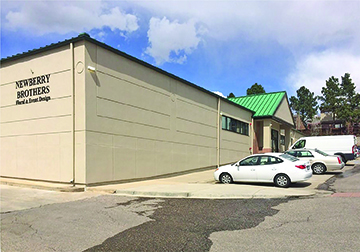
Special Spot: Newberry Brothers moved from Cherry Creek North and acquired this center on Leetsdale Drive. The five-acre site is now the florist’s latest development spot.
An enhanced pedestrian corridor or woonerf — a Dutch “living street” urban planning concept — will create a break along Leetsdale Drive. The idea is to promote community with the adjacent neighborhoods, parks, and amenities. The Cherry Creek Trail, Four Mile Historic Park, Creekside Park, Glendale Park (formerly Mir Park), Burns Park, and Crestmoor Park are all accessible within an estimated 10-minute walk. Planned pedestrian-scale improvements adjacent to the complex site along Leetsdale are expected to set the standard for future street improvements to promote walkability on Leetsdale and across the city.
Moreover, the woonerf will create a north-south corridor within the site. In addition, it will offer publicly accessible and highly visible outdoor space. Plaza areas, site furnishings, and pockets of vegetated landscape will soften and screen the outdoor area. The pedestrian area will be further enhanced with a sizable tree lawn. Rows of trees and a landscape buffer between sidewalks and buildings will enhance safety, while adding to streetscape attractiveness. Outdoor spaces will also allow for outdoor gatherings, recreation, and seasonal activity.
Additionally, the community’s future residents will enjoy private amenities. An indoor fitness center and exterior amenity courtyards are among those being planned.
Site Access
Primary access to the apartment complex from Leetsdale Drive will be at the eastern edge of the property, leading visitors and residents to the leasing center. A drop off area with an associated small surface parking lot will be adjacent. The primary entry to a structured parking garage will be accessible nearby.
A second access point is planned on the west edge of the site, extending along the north. The second point will allow for additional parking access while also providing fire access. The rear of the lot will have setbacks, including a 25-ft. building setback between the Protected District and any new building that might be built on the property. A retaining wall is permitted within the 25-ft. setback. The proposed site plan, however, does not include any retaining walls.
Changes to site design, height, massing, and infrastructure are likely before the apartment complex opens. Completion and opening of the apartment complex is projected for mid-2025.

by Charles Bonniwell | Apr 19, 2024 | Main Articles
by Charles Bonniwell
After 2016, Colorado changed from a purple state where members from either party would have a reasonable chance for statewide office to a solid blue state where only Democrats have any chance of being elected. The Democrats also have super majorities in both the State House and Senate.
The one-party state has caused the Democrat and Republican parties to begin to fracture into competing factions.
Democrats

Dafna Michaelson Jenet
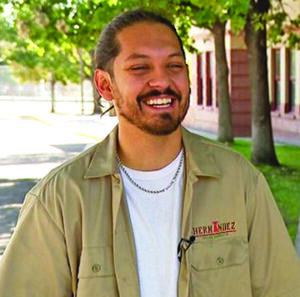
Tim Hernandez

 On the Democrat side, the pro-Palestinian faction has gone after the pro-Israeli and other members with a vengeance. Rep. Elisabeth Epps from Denver, after speaking on the Palestinian issue, joined pro-Palestinian protestors in the House gallery during a special session.
On the Democrat side, the pro-Palestinian faction has gone after the pro-Israeli and other members with a vengeance. Rep. Elisabeth Epps from Denver, after speaking on the Palestinian issue, joined pro-Palestinian protestors in the House gallery during a special session.
Another Democrat Representative Tim Hernandez said in a post on X that he is “standing in strong solidarity with Coloradans who bravely stood up and disrupted our job for a Ceasefire in Gaza.”
Reps. Iman, Jodeh, Javier Mabry, Andrew Boesenecker, Jennifer Bacon, and Sen. Nick Hinrichsen met with protestors after they were removed from the gallery by House Democrat leadership, which includes Speaker Julie McCluskie, Majority Leader Monica Duran, and Speaker Pro Tem Chris Kennedy.
The Progressive wing of the Democrat Party has always been strongly represented by Jewish members, many of whom now feel alienated from the party.
Nearly 200 Colorado Jewish Democrats, including elected officials, party leaders, and faith leaders wrote an open letter calling for an end to the divisive, dangerous rhetoric and anti semitism they claim has been displayed by some on the pro-Palestinian side.
State Senator Dafna Michaelson Jenet, one of the signers, went so far to ask whether Democrats even wanted to have any Jewish members.
Republicans

Dave Williams

Dick Wadhams
As divided as the Democrats are, the Colorado Republicans are as or more divided between their Grassroots adherents and the so-called Establishment Republicans who have controlled the party for over 40 years.
The two sides have radically different views on why Colorado has become so blue. Establishment Republicans like Dick Wadhams, the unofficial spokesman of Colorado’s richest man and biggest Republican contributor billionaire Phil Anschutz, says it is due to an influx of people flooding from California and Illinois, bringing with them, their liberal values. Moreover, he declares Coloradans, whether Democrat, Republican, or unaffiliated, strongly dislike former President Donald Trump and once Trump is gone from the scene Colorado Republicans will automatically rise back up.
Grassroot Republicans note that Establishment Republicans like Wadhams have been in charge of the party for over 40 years and have been the ones who have directed the party during its precipitous decline. They note that Trump went from losing in Colorado by only four points in 2016 to 14 points in 2020.
Trump, they indicate was no less popular or unpopular from 2016 to 2020. Grassroots Republicans say the difference between the two elections was the advent of mass ballot harvesting with all mail balloting. Wadhams and his Establishment friends are widely hated by two-thirds of the Republicans.
While the Grassroots represent a large majority of Republicans, they are totally unrepresented in the Colorado media. The left-wing media, includingThe Denver Post, Colorado Sun, Boulder Camera, Greeley Tribune, and Colorado Times Recorder greatly prefer Democrats and trash Grassroots Republicans in favor of Establishment Republications every time.
Pro Republican media in Colorado is controlled by one man, billionaire Phil Anschutz. Until now he has successfully hidden his overriding role by using a myriad of organizations. He controls, or is thought to control, among others, the Colorado Springs Gazette, Denver Gazette, Colorado Politics, Independence Institute, Complete Colorado, Caucus Room, and Advance Colorado.

Philip Anschutz
Anschutz, like many other billionaires, has moved leftward, or the party itself has moved to the populist right. As a Bush era Republican, he feels alienated by the Trump dominated Republican Party and personally it is said detests Trump and his adherents. Most Grassroots Republicans support Trump and thus the Anschutz publications are constantly attacking Grassroots Republicans. The leftwing and Anschutz media and what they represent are called by the Grassroots the “Uni Party.”
The Grassroots, in the Spring of 2023 pulled off a political upset and took over the Republican Party, electing a slate of Grassroots Republicans, and in particular Dave Williams as Party Chairman.
Since Williams’ election the leftwing and Anschutz media have been unrelentingly attacking Williams.
However, Donald Trump, has ridden to Williams’ aid within the Colorado Republican Party by declaring on Truth Social that Williams “is under Fake News assault because he is doing such a strong job as an advocate for MAGA.”
Local radio used to be a source for pro Trump support but among local radio show hosts all but RNC Committeeman Randy Corporon have become Establishment. 710KNUS shoved Corporan to the least desirable radio time — Saturday nights.
Among websites there is one that is driving Establishment Republicans crazy and that is RINO Watch Colorado. Its “take no prisoners” style has made it beloved by Grassroots Republications and hated by leftwing and Anschutz media.
What Is To Come?
Will the parties begin to split up? If there is any lesson from history, it is that when one faction gains total control new groups arise to challenge its hegemony.
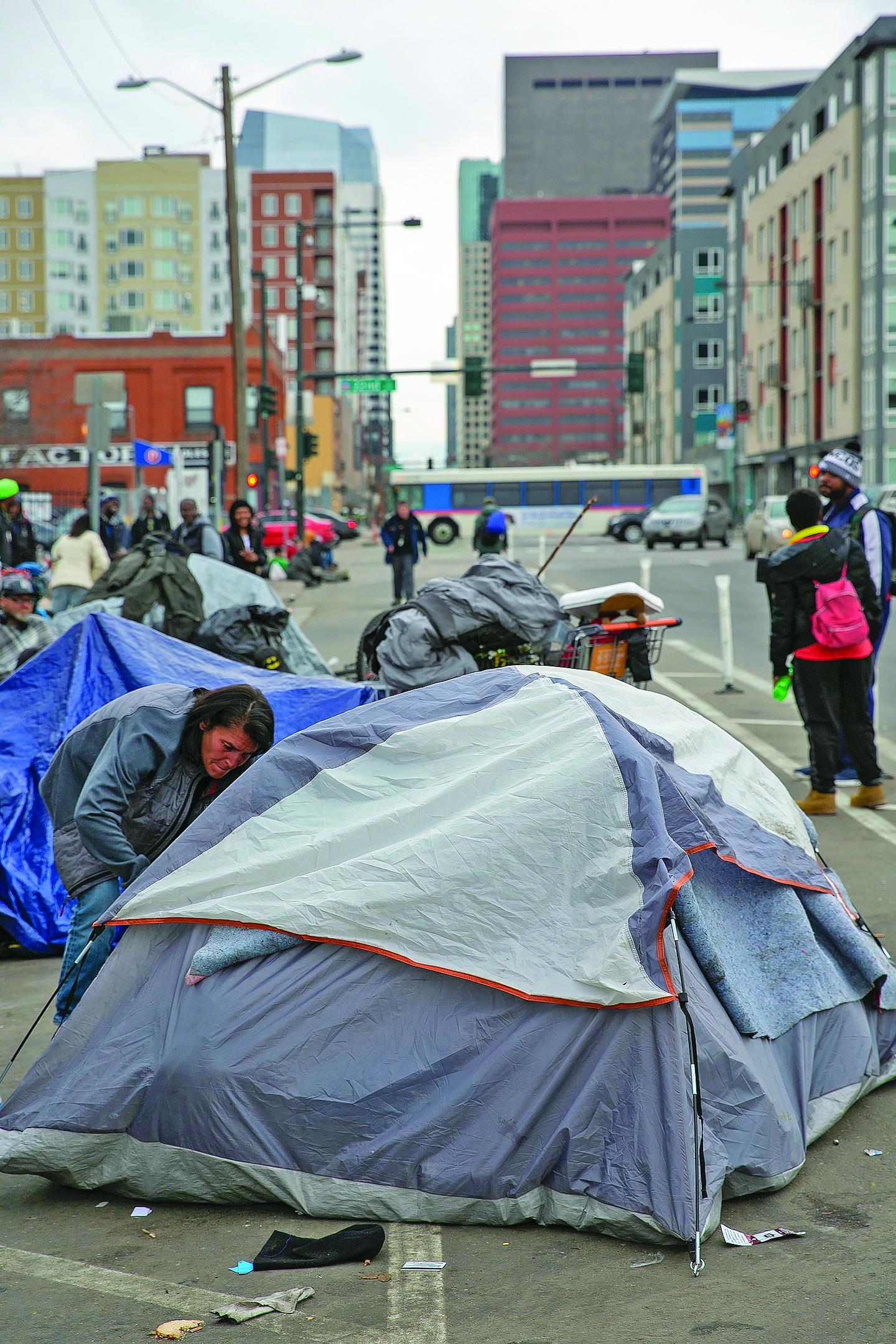
by Mark Smiley | Mar 18, 2024 | Main Articles
Mayor Cuts Service, Hours At Parks & Recreation, DMV, Plans More; The Mayor, City Are Prioritizing Migrants Over Them
by Glen Richardson
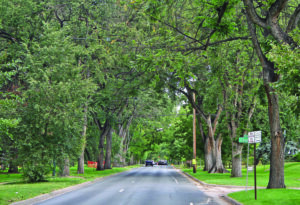
Slighting Streets: Denver’s East Sixth Ave. Parkway — listed on the National Register of Historic Places — and the city’s 15 other parkways will no longer be cared for by Parks & Recreation.
Given the callous title of “coldhearted” after refusing to ban homeless camp sweeps in cold temperatures, merciless Denver Mayor Mike Johnston is winning a new title, “cutthroat.”
With 40,000 migrants — almost 5% of the city’s entire population — having arrived here from Venezuela and other places in the world in the last 12 months, Johnston has announced enormous cuts to city services, hours due to the burden of migrants, and its stress on city resources. Furthermore, he warns. “This is the first phase of cuts and the city aims for reductions across many departments.”
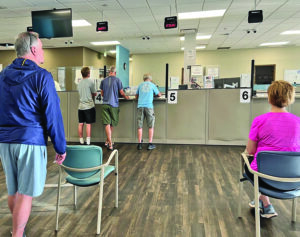
DMV Decelerates: DMV is no longer processing vehicle registration renewals in person, only online. Only new registrations are currently being processed in person.
Homeless Growth
The migrant burden, of course, is on top of the more than 4,000 homeless people either sleeping on city streets or in shelters. Denver now ranks as having the nation’s fifth-largest homeless population.
Moreover, Denver ranks third nationally in the increase of homelessness in a single year. Sadder still, the Mile High City ranks second in the country with the largest upsurge — at 116% — in the number of homeless families with children.
Adding it up: The homeless population grew 32% in the 12-month period at the end of 2023. At least 311 homeless people died in Denver last year, more than any other year.
Fading Flower Beds
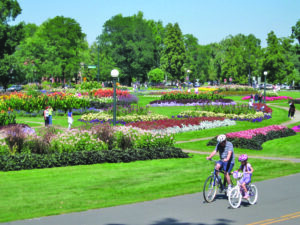
Drab Denver Deed: Mayor’s decision not to plant the city’s annual flower beds — roughly 545 citywide — is about to turn the Mile High City drab, including at Wash Park.
Due to the city’s surging migrant burden, Johnston is initially reducing hours and services at Denver Parks & Recreation and
Denver Motor Ve
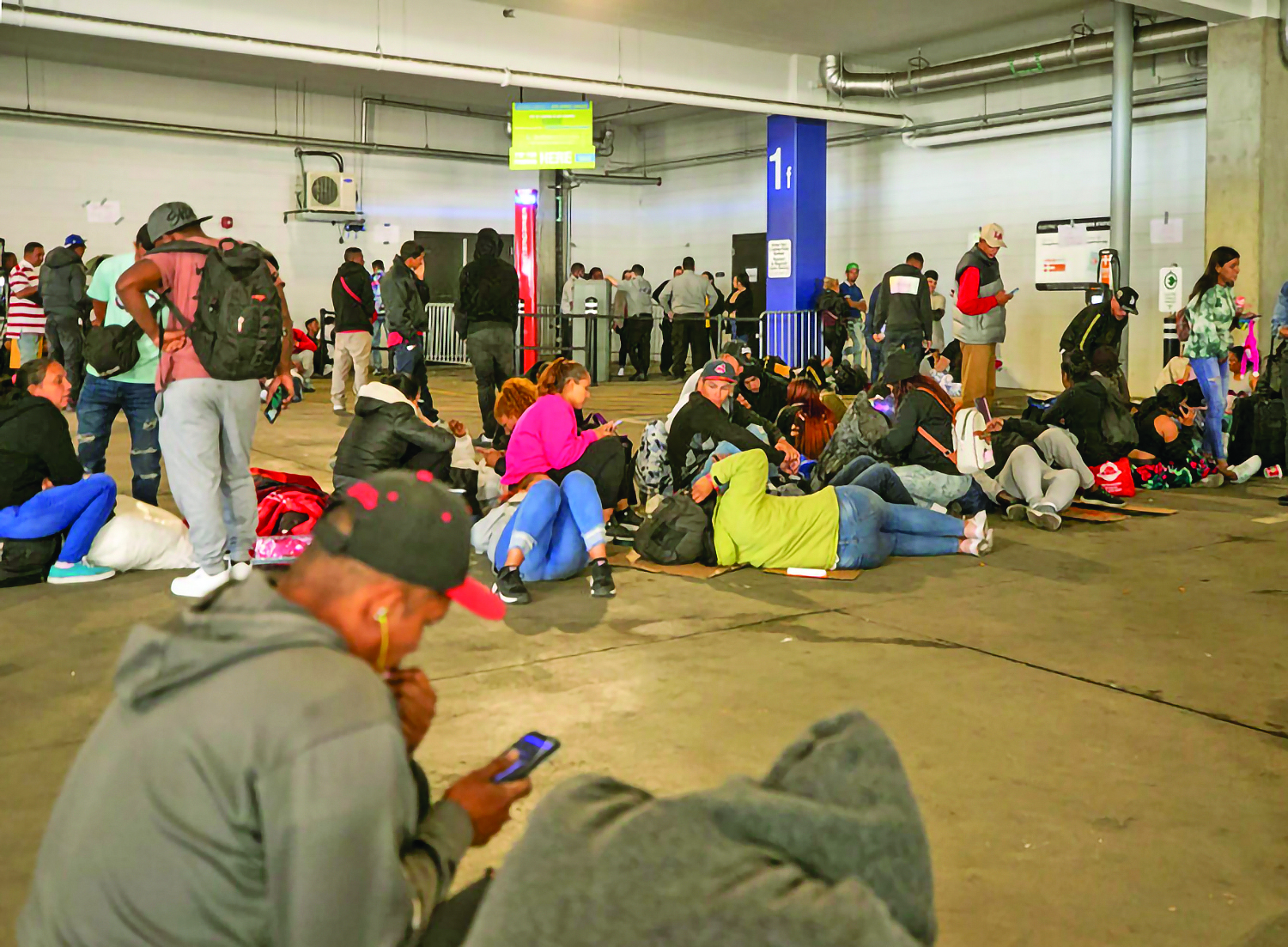
Destitute In Denver: Denver’s homeless population, or people without housing, grew 32% in the 12-month period at the end of 2023.
hicles (DMV). He emphasizes, moreover, that the initial reductions are just the first phase of cuts and that the city’s intentions are to make equal slashes “across many departments.”
Cuts in services, hours at Parks & Recreation are already underway. For many if not most citizens and visitors to Denver, the most appalling is the decision not to plant the city’s annual flower beds. The Mile High City normally plants roughly 545 beds each year. The distressing decision will eliminate all of them unless the plots are planted by volunteers.
For generations the city’s flower beds have been a way of cultivating community. Among those that will be missed the most: The two at Wash Park — one a replica of George Washington’s Mount Vernon Garden. Likewise, the decision crushes the colorful gardens at City Park; plus, the perennial flower beds on 7th Ave. Parkway. The verdict will also abolish Alamo Placita Park’s formal garden that has always beautified the drive along Speer Blvd. near Downing St.
City Workers Impact
Reduction in days and hours at Parks & Recreation are already underway, but do not involve layoffs of current employees. However, hourly workers can expect fewer hours, and on-call and seasonal workers will be most impacted.
Regional Centers that were open seven days a week will only be open for six days a week. Those open six days a week, will stay open for the same number of days, but the hours of operation will be reduced. Summer Recreation Programming in Denver will be reduced by 25% across the program.
As for the seasonal workers, the mayor admits that some seasonal workers have been with the city for 20 years. Declaring he’s not hiding the fact that the decision will matter to a lot of city employees that are on the frontlines, “It’s a plan for shared sacrifice,” he says. Adding, “This is what good people do in hard situations.”
Downturns At DMV
The DMV has also started making changes to services and hours. They are no longer taking vehicle registrations in person. Everything has been moved to online.
In addition to no longer processing vehicle registration renewals in person, DMV is taking them online, through the mail, or at kiosks. New registrations, however, are still being processed in person.
Sites have started rotating weekly DMV closures. Only DMV’s central spot at Tremont is staying open permanently. The city’s satellite spots are rotating, closing one week at a time.

Destitute In Denver: Denver’s homeless population, or people without housing, grew 32% in the 12-month period at the end of 2023.
Savings Vs. Spending
According to the mayor, the cuts to Parks & Recreation and DMV will save roughly $5 million. Denver has also already “paused” new applications submitted by businesses and families for public events, special occasions, and tournaments.
Since December 2022, Denver has spent $42 million supporting migrants. The state of Colorado recently awarded the city $3.5 million in reimbursements, and the Department of Homeland Security has approved up to another $9 million for the city
Countless citizens continue to criticize the city, suggesting the Mile High City and the mayor are prioritizing migrants over them.
School Influx Soars
It’s not only the city of Denver that has been affected by rising migrant counts, so has Denver Public Schools (DPS).
More than 6,000 new migrants have enrolled in DPS schools since this summer. Currently the district is enrolling about 100 new students a week and the number isn’t slackening off.
DPS officials say at least 25 schools have 50 or more new students.

 A political website called “RINO Watch Colorado” (www.rinowatchco.com) has turned the political media world upside down in Colorado. The website was mentioned in last month’s lead story (As Colorado Becomes A One-Party State The Main Parties Fracture). RINO Watch bills itself as “the voice of grassroots Republicans” where “it exposes RINOs (Republicans In Name Only)” and “supports grassroots Patriots” while “cutting through the Establishment and liberal spin.”
A political website called “RINO Watch Colorado” (www.rinowatchco.com) has turned the political media world upside down in Colorado. The website was mentioned in last month’s lead story (As Colorado Becomes A One-Party State The Main Parties Fracture). RINO Watch bills itself as “the voice of grassroots Republicans” where “it exposes RINOs (Republicans In Name Only)” and “supports grassroots Patriots” while “cutting through the Establishment and liberal spin.”





































